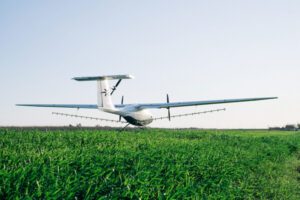
Pyka Pelican Spray Receives FAA Authorization for Commercial Use
by DRONELIFE Staff Writer Ian J. McNabb
Continue reading below, or listen:
Pyka Inc., a UAV designer and manufacturer based in Oakland, California, announced that their Pelican Spray crop-protection aircraft has received FAA approval. With a gross weight of 1125 lbs, the highly automated UAS is the heaviest to ever receive FAA authorization for commercial use in the United States. In conjunction with an agricultural aircraft operator certificate, farmers can start using the Pelican to enhance operations. The Pelican is powered by four electric engines totaling 100kw and features swappable batteries and a carbon airframe.
Pyka highlights the dangers of agricultural flight in their press release- last year, the National Transportation Safety Board reported 54 aircraft accidents in agricultural operations, resulting in 13 deaths. The Pelican Spray is more environmentally friendly than manned aircraft applications as well, allowing for lower chemical use and more precise application of agricultural sprays. Already operational in Costa Rica, Honduras, and Brazil, the Pelican Spray can carry up to 540 lbs of liquid and spray up to 240 acres an hour.
“We are beyond thrilled to celebrate this commercial approval and regulatory milestone,” said Michael Norcia, Chief Executive Officer of Pyka. “Pyka’s aircraft provide an essential tool for protecting crops, unlocking cost savings for growers, and reducing our impact on the environment. This commercial approval is the first step in enabling us to generate massive value for growers in the U.S., Latin America, and other markets we operate in, while also laying the operational and regulatory groundwork for eventual scaling into uncrewed cargo operations worldwide.”
To help them in the approvals process, Pyka was assisted by Hogan Lovells’ UAS Practice, headed by drone industry leader Lisa Ellman, who said, “This is a significant win for Pyka and the agricultural community they serve. Among other safety and environmental benefits, the use of highly-automated UAS like the Pelican to perform potentially hazardous aircraft operations can reduce the number of pilot fatalities that occur each year in the aerial agricultural spraying industry.”
Read more:
- Matternet’s Type Certification: Law Firm Hogan Lovells Weighs In
- Remote ID and Flight Over People are Here: What’s Next for U.S. Drone Regulations? Hogan Lovells’ Lisa Ellman, Arjun Garg
- Drones in Agriculture: Part 137 and Leveraging Spraying Drones
- India Works to Teach Farmers About Agriculture Drones: Garuda Aerospace and Dept. of Agriculture Collaborate on Drone Yatra
- DJI Agriculture Launches Mavic 3 Multispectral: Safety and Portability in the Field
Ian McNabb is a staff writer based in Boston, MA. His interests include geopolitics, emerging technologies, environmental sustainability, and Boston College sports.

Miriam McNabb is the Editor-in-Chief of DRONELIFE and CEO of JobForDrones, a professional drone services marketplace, and a fascinated observer of the emerging drone industry and the regulatory environment for drones. Miriam has penned over 3,000 articles focused on the commercial drone space and is an international speaker and recognized figure in the industry. Miriam has a degree from the University of Chicago and over 20 years of experience in high tech sales and marketing for new technologies.
For drone industry consulting or writing, Email Miriam.
TWITTER:@spaldingbarker
Subscribe to DroneLife here.